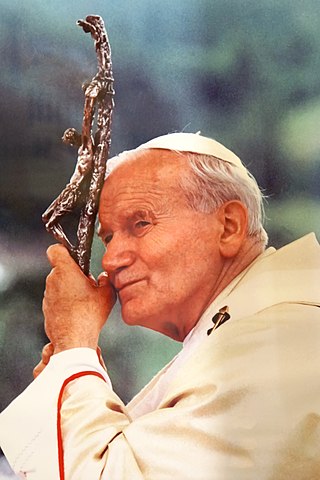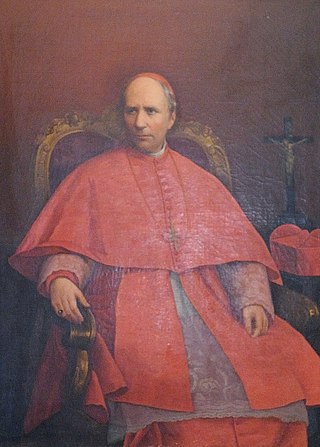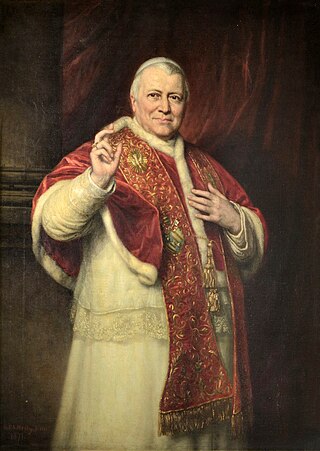Related Research Articles
The Council of Constance was an ecumenical council of the Catholic Church that was held from 1414 to 1418 in the Bishopric of Constance (Konstanz) in present-day Germany. The council ended the Western Schism by deposing or accepting the resignation of the remaining papal claimants and by electing Pope Martin V. It was the last papal election to take place outside of Italy.

The First Ecumenical Council of the Vatican, commonly known as the First Vatican Council or Vatican I, was the 20th ecumenical council of the Catholic Church, held three centuries after the preceding Council of Trent which was adjourned in 1563. The council was convoked by Pope Pius IX on 29 June 1868, under the rising threat of the Kingdom of Italy encroaching on the Papal States. It opened on 8 December 1869 and was adjourned on 20 September 1870 after the Italian Capture of Rome. Its best-known decision is its definition of papal infallibility.

The pope, also known as the supreme pontiff, Roman pontiff or sovereign pontiff, is the bishop of Rome, head of the worldwide Catholic Church, and has also served as the head of state or sovereign of the Papal States and later the Vatican City State since the eighth century. From a Catholic viewpoint, the primacy of the bishop of Rome is largely derived from his role as the apostolic successor to Saint Peter, to whom primacy was conferred by Jesus, who gave Peter the Keys of Heaven and the powers of "binding and loosing", naming him as the "rock" upon which the Church would be built. The current pope is Francis, who was elected on 13 March 2013.

Pope John Paul II was head of the Catholic Church and sovereign of the Vatican City State from 1978 until his death in 2005.
Sedevacantism is a traditionalist Catholic movement which holds that since the death of Pius XII the alleged occupiers of the Holy See are not valid popes due to their espousal of one or more heresies and that, for lack of a valid pope, the See of Rome is thus vacant. Sedevacantism owes its origins to the rejection of the theological and disciplinary changes implemented following the Second Vatican Council (1962–1965).

Ultramontanism is a clerical political conception within the Catholic Church that places strong emphasis on the prerogatives and powers of the Pope. It contrasts with Gallicanism, the belief that popular civil authority—often represented by the monarch's or state's authority—over the Church is comparable to that of the Pope.

The magisterium of the Catholic Church is the church's authority or office to give authentic interpretation of the word of God, "whether in its written form or in the form of Tradition". According to the 1992 Catechism of the Catholic Church, the task of interpretation is vested uniquely in the Pope and the bishops, though the concept has a complex history of development. Scripture and Tradition "make up a single sacred deposit of the Word of God, which is entrusted to the Church", and the magisterium is not independent of this, since "all that it proposes for belief as being divinely revealed is derived from this single deposit of faith".

The Catholic Church, also known as the Roman Catholic Church, is the largest Christian church, with 1.378 billion baptized Catholics worldwide as of 2021. It is among the world's oldest and largest international institutions, and has played a prominent role in the history and development of Western civilization. The church consists of 24 sui iuris churches, including the Latin Church and 23 Eastern Catholic Churches, which comprise almost 3,500 dioceses and eparchies located around the world. The pope, who is the bishop of Rome, is the chief pastor of the church. The Diocese of Rome, known as the Holy See, is the central governing authority of the church. The administrative body of the Holy See, the Roman Curia, has its principal offices in Vatican City, a small independent city-state and enclave within the Italian capital city of Rome, of which the pope is head of state.
A papal renunciation also called a papal abdication, occurs when the current pope of the Catholic Church voluntarily resigns his position. As a pope's time in office has conventionally lasted from his election until his death, a papal renunciation is an uncommon event. Before the 21st century, only five popes unambiguously resigned with historical certainty, all between the 10th and 15th centuries. Additionally, there are disputed claims of four popes having resigned, dating from the 3rd to the 11th centuries; a fifth disputed case may have involved an antipope.

George Weigel is an American Catholic neoconservative author, political analyst, and social activist. He currently serves as a Distinguished Senior Fellow of the Ethics and Public Policy Center. Weigel was the Founding President of the James Madison Foundation. He is the author of a best-selling biography of Pope John Paul II, Witness to Hope, and Tranquillitas Ordinis: The Present Failure and Future Promise of American Catholic Thought on War and Peace.

The Catholic Church holds no official position on the theory of creation or evolution, leaving the specifics of either theistic evolution or literal creationism to the individual within certain parameters established by the Church. According to the Catechism of the Catholic Church, any believer may accept either literal or special creation within the period of an actual six-day, twenty-four-hour period, or they may accept the belief that the earth evolved over time under the guidance of God. Catholicism holds that God initiated and continued the process of his creation, that Adam and Eve were real people, and that all humans, whether specially created or evolved, have and have always had specially created souls for each individual.

Paul Cardinal Cullen was Roman Catholic Archbishop of Dublin and previously of Armagh, and the first Irish cardinal. His Ultramontanism spearheaded the Romanisation of the Catholic Church in Ireland and ushered in the devotional revolution experienced in Ireland through the second half of the 19th century and much of the 20th century. A trained biblical theologian and scholar of ancient languages, Cullen crafted the formula for papal infallibility at the First Vatican Council.
Sedeprivationism is a doctrinal position within Traditionalist Catholicism which holds that the current occupant of the Holy See is a duly-elected pope, but lacks the authority and ability to teach or to govern unless he recants the changes brought by the Second Vatican Council. The doctrine asserts that since this council, occupants of the See of Peter are popes materialiter sed non formaliter, that is "materially but not formally". As such, sedeprivationists teach that Pope John XXIII, Pope Paul VI, Pope John Paul I, Pope John Paul II, Pope Benedict XVI, and Pope Francis have not attained fullness of the papacy.

According to Roman Catholicism, the history of the papacy, the office held by the pope as head of the Catholic Church, spans from the time of Peter to the present day.
Neo-ultramontanism is the belief of certain Roman Catholics, primarily during the period immediately prior to the First Vatican Council, that papal infallibility was not restricted to a small number of papal statements but applied ipso facto to all papal teachings and statements.
Capital punishment in Vatican City was legal between 1929 and 1969, reserved for attempted assassination of the Pope, but has never been applied there. Executions were carried out elsewhere in the Papal States, which was the predecessor of the Vatican City, during their existence.

A dogma of the Catholic Church is defined as "a truth revealed by God, which the magisterium of the Church declared as binding". The Catechism of the Catholic Church states:
The Church's Magisterium asserts that it exercises the authority it holds from Christ to the fullest extent when it defines dogmas, that is, when it proposes, in a form obliging Catholics to an irrevocable adherence of faith, truths contained in divine Revelation or also when it proposes, in a definitive way, truths having a necessary connection with these.
The tradition of the Catholic Church claims it began with Jesus Christ and his teachings; the Catholic tradition considers that the Church is a continuation of the early Christian community established by the Disciples of Jesus. The Church considers its bishops to be the successors to Jesus's apostles and the Church's leader, the Bishop of Rome, to be the sole successor to St Peter who ministered in Rome in the first century AD after his appointment by Jesus as head of the Church. By the end of the 2nd century, bishops began congregating in regional synods to resolve doctrinal and administrative issues. Historian Eamon Duffy claims that by the 3rd century, the church at Rome might even function as a court of appeal on doctrinal issues.

Papal infallibility is a dogma of the Catholic Church which states that, in virtue of the promise of Jesus to Peter, the Pope when he speaks ex cathedra is preserved from the possibility of error on doctrine "initially given to the apostolic Church and handed down in Scripture and tradition". It does not mean that the pope cannot sin or otherwise err in some capacity, though he is prevented by the assistance of the Holy Spirit from issuing heretical teaching even in his non-infallible Magisterium, as a corollary of indefectibility. This doctrine, defined dogmatically at the First Vatican Council of 1869–1870 in the document Pastor aeternus, is claimed to have existed in medieval theology and to have been the majority opinion at the time of the Counter-Reformation.
In the course of his papacy, Benedict XVI issued two documents altering certain details of the procedures for electing a pope: De electione romani pontificis on 11 June 2007 and Normas nonnullas on 22 February 2013. These instructions amended the extensive set of rules and procedures issued on 22 February 1996 by his predecessor John Paul II in his apostolic constitution Universi Dominici gregis.
References
- ↑ Collins, Paul. "Reasons for Resignation". The Association for the Rights of Catholics. Archived from the original on 11 August 2011. Retrieved 26 March 2012.